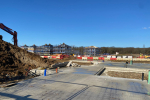
Fareham MP Suella Braverman has welcomed a Government announcement that Fareham Borough Council has won funding to assist with a new housing development. The award of £300,000 is aimed at helping to with the designing and delivery of the proposed Welborne Garden Village.
The Garden Village is an initiative proposed by Fareham Borough Council to deliver around 6,000 new homes over the next 20-25 years in order to meet the housing needs of more than 13,000 people. The proposed development is earmarked to be located immediately north of the M27 encompassing Junction 10 and is said to help address the under-supply of family homes.
In a letter to Suella Braverman, the Housing and Planning Minister Kit Malthouse outlined that the money will be used to fund staff teams and planning work, along with the necessary studies and needed to deliver the homes.
The announcement follows the Southern Policy Centre report A Great Place to Live if You Can Afford It highlighting the downside of high house prices in the county. The issue of house prices has proven divisive – with higher prices representing a comfort to many who have seen the value of their property rise, yet proving prohibitively expensive for many first time buyers. According to the retailing platform Zoopla, the current average value of a house in Fareham is £330,000 – pointing both to the desirable location within Hampshire and also to a local housing shortage.
Welcoming the announcement, Suella Braverman said:
“I welcome the announcement that Fareham Borough Council has been awarded £300,000 towards the delivery of Welborne Garden Village. This funding will be instrumental for the development of much needed new homes in the area.
“Higher house prices are an important source of security for many, however, too many capable and talented young people are being forced to leave Fareham because they simply cannot afford to live in the area. The delivery of a new generation of well-designed and sympathetic housing will be a welcome contribution in our bid to address the urgent need for more houses in the South.”


